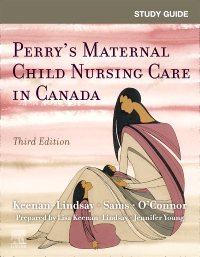
Study Guide for Perry’s Maternal Child Nursing Care in Canada, 3rd Edition
Paperback

Now $41.84
The new Study Guide for Perry’s Maternal Child Nursing Care in Canada is designed to help you review and master content from the core text and learn how to think critically in applying your knowledge. Chapters parallel those in the text and provide review, critical thinking applications, engaging activities, and more, with an answer key at the back of the book. This comprehensive study guide also contains case studies to help you integrate information and develop the critical thinking, clinical reasoning, and clinical judgement skills required to pass your licensure examination and excel in clinical practice.
-
- Thinking Critically case-based activities require students to apply the concepts found in the chapters to solve problems, make clinical judgement decisions concerning care management, and provide responses to patient questions and concerns.
- Reviewing Key Concepts questions in various formats give students ample opportunities to assess their knowledge and comprehension of information covered in the text.
- Matching, fill-in-the-blank, true/false, short-answer, and multiple-choice activities help students identify the core content of each chapter and test their understanding.
- Learning Key Terms matching and fill-in-the-blank questions let students test their ability to define all key terms highlighted in the corresponding textbook chapter.
- Perforated pages allow you to use activities for graded assignments.
- Answer key at the end of the book includes answers to all questions.
-
Part 1: Maternal Child Nursing
UNIT 1: INTRODUCTION TO MATERNAL CHILD NURSING
1. Contemporary Perinatal and Pediatric Nursing in Canada
2. The Family and Culture
3. Community Care
Part 2: Perinatal Nursing
UNIT 2: INTRODUCTION TO PERINATAL NURSING
4. Perinatal Nursing in Canada
UNIT 3: WOMEN’S HEALTH
5. Health Promotion
6. Health Assessment
7. Reproductive Health
8. Infertility, Contraception, and Abortion
UNIT 4: PREGNANCY
9. Preconception, Genetics, Conception, and Fetal Development
10. Anatomy and Physiology of Pregnancy
11. Nursing Care During Pregnancy
12. Maternal Nutrition During Pregnancy
13. Pregnancy Risk Factors and Assessment
14. Pregnancy at Risk: Gestational Conditions
15. Pregnancy at Risk: Pre-existing Conditions
UNIT 5: CHILDBIRTH
16. Labour and Birth Processes
17. Nursing Care of the Family During Labour and Birth
18. Pain Management During Labour
19. Fetal Health Surveillance During Labour
20. Labour and Birth at Risk
UNIT 6: POSTPARTUM PERIOD
21. Postpartum Maternal Physiological Changes
22. Nursing Care of the Family During the Postpartum Period
23. Transition to Parenthood
24. Postpartum Complications
UNIT 7: NEWBORN
25. Physiological Adaptations of the Newborn
26. Nursing Care of the Newborn and Family
27. Newborn Nutrition
28. Infants with Gestational Age–Related Problems
29. The Newborn at Risk: Acquired and Congenital Problems
Part 3: Pediatric Nursing
UNIT 8: CHILDREN, THEIR FAMILIES, AND THE NURSE
30. Pediatric Nursing in Canada
31. Family, Social, Cultural, and Religious Influences on Children’s Health
32. Developmental Influences on Child Health
UNIT 9: ASSESSMENT OF THE CHILD AND FAMILY
33. Pediatric Health Assessment
34. Pain Assessment and Management
UNIT 10: DEVELOPMENTAL STAGES AND HEALTH PROMOTION
35. Pediatric Health Promotion
36. The Infant and Family
37. The Toddler and Family
38. The Preschooler and Family
39. The School-Age Child and Family
40. The Adolescent and Family
UNIT 11: SPECIAL NEEDS, ILLNESS, AND HOSPITALIZATION
41. Chronic Illness, Complex Conditions, and End-of-Life Care
42. Cognitive and Sensory Impairment
43. Reaction to Illness and Hospitalization
44. Pediatric Variations of Nursing Interventions
UNIT 12: HEALTH PROBLEMS OF CHILDREN
45. Respiratory Concerns
46. Gastrointestinal Concerns
47. Cardiovascular Concerns
48. Hematological and Immunological Concerns
49. Genitourinary Concerns
50. Neurological Concerns
51. Endocrine Concerns
52. Integumentary Concerns
53. Musculoskeletal or Articular Concerns
54. Neuromuscular or Muscular Concerns
55. Mental Health Concerns
Answer Key



 as described in our
as described in our 